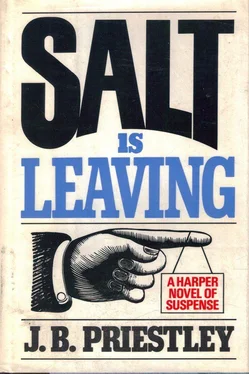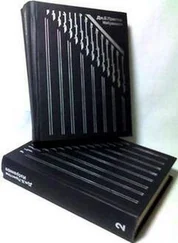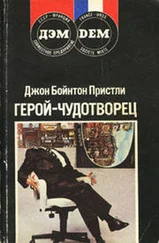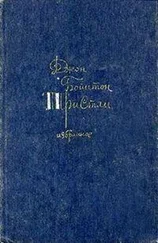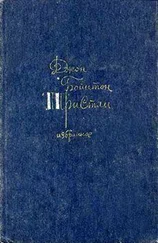"That's what happens," he told her. "Once you don't see something, you keep on not seeing it." He handed her a rather large but delicate cup, without a saucer. "It happens all too often in my profession. We miss what is staring us in the face."
"Thank you for this tea," said Maggie after a silent interval. "It's delicious." Then, after some hesitation: "I've been telling myself what a charming room this must have been before you began pulling yourself out of it. And I couldn't help feeling that a woman must have had a hand in it originally."
"My wife. She died three years ago. Leukaemia."
Deciding in a flash not to say she was sorry or make any apology, Maggie said: "It was a good marriage, wasn't it?"
"Yes. We were very happy. Perhaps we used up our ration. Do you like Birkden, Maggie?"
"I hardly know it. But I don't find it interesting. It's the wrong size, neither one thing nor the other. I spent five years in London. Then I came back to Hemton, which is small and sensible and still attractive in spots. I can take Hemton, I can take London, but not a town like this, too big and yet not big enough. And as you"re leaving it, I imagine you don't care for it much."
"I don't – no. It was all right when there were two of us. But now, having got rid of my practice, I'd like to get out as soon as I can. Go a long way, if possible. But I'm not going until I know what happened to Noreen Wilks." He said this very quietly, in his usual rather sleepy tone, but Maggie knew at once that he meant exactly what he said.
"Tell me about her. Was she somebody – rather special for you, Dr Salt?"
"As a person – not at all. She was rather prettier than most – but I've had dozens just like her in and out of my surgery. Thoughtless – silly – though not vicious in any way. But she was important to me as a patient because she was suffering from a type of kidney disease I'm particularly interested in. Hoped to specialize in it once. Might still have a try. I'd hit on a treatment that was keeping her going nicely. If she missed it for a couple of weeks, she'd soon run into a screaming hypertension and after that she'd be fighting for her life. She knew this. I'd given her a thorough fright about it." He explained then, as he had done to Superintendent Hurst, how he had made Noreen promise to see a doctor, showing him the brief report on her case that she always carried in her bag, wherever she might be. "I don't think she went abroad," he concluded. "And any English doctor would have got in touch with me – or Dr Baldwin, who now has my practice. He's heard nothing, and neither have I. And she's been missing now for three weeks."
"So – what do you think?"
"I could be wrong," he said slowly. "But I think she's dead." He kept silent for a few moments. "Have some more tea, Maggie."
"Thank you." While he was filling her cup, she said hesitantly: "Dr Salt – I suppose I've no right to say this – but I can't help feeling that you haven't told me all you know."
"Yes, I have. All I know . The rest is so much guessing – some of it pretty wild. And, of course, your father doesn't come into it. He's quite new in the picture-"
"Yes, but there's the unpleasant young man who seems to have frightened Peggy Pearson and who came to see you, you said. Where does he come in? What did he want? Or am I being too curious?"
"I might think so, Maggie, if it weren't for one thing. Your father's somehow involved in this."
"I know." She blinked hard. "Though I can't imagine how or why. But I'm sure now he is ."
He nodded, then drank some tea and lit his pipe again, using what seemed to be an outsize gas lighter. He smoked and said nothing for what must have been about a minute, while Maggie controlled her impatience.
Finally: "Who do you have at home with you?"
"My mother. And I'm not going to tell her any of this. My brother, Alan, who's several years older than me, not married, and lectures on physics at the University – Hemtonshire, I mean, of course."
"Ah – clever chap?"
"Very clever in some ways. Idiotic in others. Hasn't really quite grown up. But I'll tell him everything, of course. He might be a great help."
"Would you like to leave it to him?"
"Certainly not." She was indignant. "Besides, I can spare more time."
He waited a moment. "Because your father's somehow involved in this Noreen Wilks business, it doesn't follow that you ought to be- No, listen to me, Maggie. You still have a choice. Either go home now and try to forget about Noreen – and me. Or – help me to find out what happened to her – in the hope you might discover where your father is and what he's doing. I believe, though I can't prove it, that there's a definite connection. And I could do with some help, from both you and your brother."
"Then that's settled," she said impatiently.
"Not quite. We may have to take the lid off Birkden. What we find inside may be very unpleasant. It might even be dangerous."
"Dr Salt, I'm disappointed. I didn't think you'd be the sort of man to exaggerate like that-"
"You were right then, wrong now."
"We"re in Birkden, not Chicago or New York-"
"You"re years out of date, Maggie. You"re now in a distant suburb of New York and Chicago. I'm not talking for effect. I never do. I've spent seven years as a GP here in Birkden. I know what goes on. But not all. Not enough." And he almost shouted this, surprising Maggie, who told herself again what an odd man he was. "And now I ought to see a man, and, if you"re going to help, then you might learn something by coming with me. I'll ring up to make sure he's there."
"Then I'll clear away the tea things." And then, when she saw the kitchen, he surprised her again. Instead of being a horrible mess of unwashed dishes and cutlery and mouldy this and smelly that, it was cleaner and tidier than their kitchen at home. Hastily she began washing and drying the tea things.
"He's there. Let's go." He was so curt that she wondered if he resented her being in the kitchen. Did men feel things like that? She went out, wondering. He was certainly very much a doctor and yet quite unlike any other doctor she'd ever met. As she waited for him to lock the door, she noticed the card he had pinned on it: L. H . Salt . "What do L. H. stand for?" she asked him as they went to his car.
"Lionel Humphrey," he told her gruffly. "And now just forget "em. Call me Salt when you"re tired of doctoring me."
"Okay, Salt," she cried, a bit too heartily to cover her nervousness.
He neither smiled nor seemed offended. Probably he didn't care a damn what she – or, for that matter, anybody else – called him. He seemed the oddest mixture – one minute sleepy, simple and rather sweet – the next minute hard and ruthless. Either too busy driving or thinking hard, he didn't talk, so she had plenty of time to wonder about him as he drove through a number of side roads, by-passing the centre of the town, and finally arriving at a part of it strange to her. It was a dingy and tumbledown region; most of its buildings looking as if they were waiting to be demolished.
CHAPTER FOUR
At Buzzy Duffield's
1
Dr Salt stopped the car near a barred entrance, which had above it a neon sign, not switched on yet, that said Buzzy " s . When they got out, he found a narrow doorway, not far from the club entrance, and he led the way up some rickety wooden stairs. At the top there was some sort of office hardly bigger than a hanging cupboard. Looking important in it was a thin, spectacled youth, like a rather older version of Reg Morgan. "To see Mr Duffield?" he inquired primly. "Have you an appointment?"
"Yes. I'm Dr Salt."
"Of course – you telephoned. This way, please."
Читать дальше
